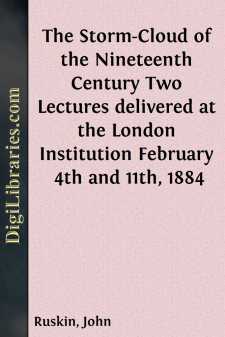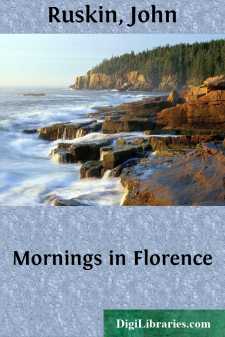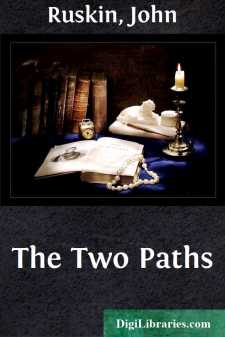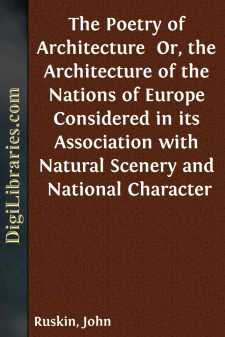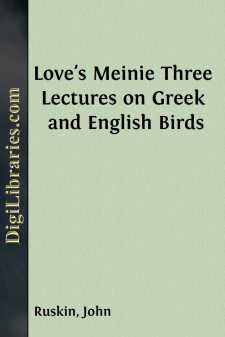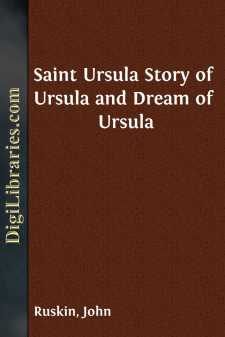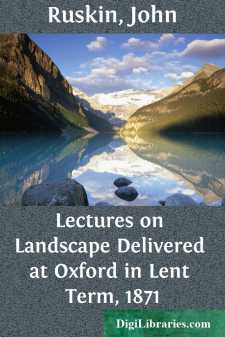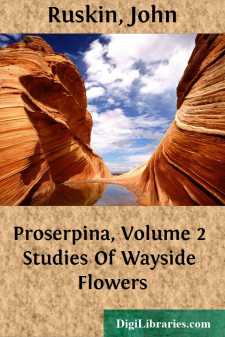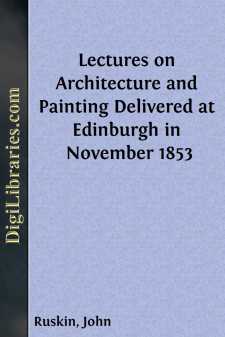Categories
- Antiques & Collectibles 13
- Architecture 36
- Art 48
- Bibles 22
- Biography & Autobiography 815
- Body, Mind & Spirit 144
- Business & Economics 28
- Children's Books 18
- Children's Fiction 14
- Computers 4
- Cooking 94
- Crafts & Hobbies 4
- Drama 346
- Education 58
- Family & Relationships 59
- Fiction 11834
- Games 19
- Gardening 17
- Health & Fitness 34
- History 1378
- House & Home 1
- Humor 147
- Juvenile Fiction 1873
- Juvenile Nonfiction 202
- Language Arts & Disciplines 89
- Law 16
- Literary Collections 686
- Literary Criticism 179
- Mathematics 13
- Medical 41
- Music 40
- Nature 179
- Non-Classifiable 1768
- Performing Arts 7
- Periodicals 1453
- Philosophy 65
- Photography 2
- Poetry 896
- Political Science 203
- Psychology 44
- Reference 154
- Religion 515
- Science 126
- Self-Help 85
- Social Science 83
- Sports & Recreation 34
- Study Aids 3
- Technology & Engineering 59
- Transportation 23
- Travel 463
- True Crime 29
Sort by:
by:
John Ruskin
PREFACE. The following lectures, drawn up under the pressure of more imperative and quite otherwise directed work, contain many passages which stand in need of support, and some, I do not doubt, more or less of correction, which I always prefer to receive openly from the better knowledge of friends, after setting down my own impressions of the matter in clearness as far as they reach, than to guard...
more...
by:
John Ruskin
LECTURE I. THE DISCOVERY AND APPLICATION OF ART. A Lecture delivered at Manchester, July 10, 1857. 1. Among the various characteristics of the age in which we live, as compared with other ages of this not yet very experienced world, one of the most notable appears to me to be the just and wholesome contempt in which we hold poverty. I repeat, the just and wholesome contempt; though I see that some of...
more...
by:
John Ruskin
THE FIRST MORNING. SANTA CROCE. If there is one artist, more than another, whose work it is desirable that you should examine in Florence, supposing that you care for old art at all, it is Giotto. You can, indeed, also see work of his at Assisi; but it is not likely you will stop there, to any purpose. At Padua there is much; but only of one period. At Florence, which is his birthplace, you can see...
more...
by:
John Ruskin
PREFACE. The following addresses, though spoken at different times, are intentionally connected in subject; their aim being to set one or two main principles of art in simple light before the general student, and to indicate their practical bearing on modern design. The law which it has been my effort chiefly to illustrate is the dependence of all noble design, in any kind, on the sculpture or painting...
more...
by:
John Ruskin
INTRODUCTION. 1. The Science of Architecture, followed out to its full extent, is one of the noblest of those which have reference only to the creations of human minds. It is not merely a science of the rule and compass, it does not consist only in the observation of just rule, or of fair proportion: it is, or ought to be, a science of feeling more than of rule, a ministry to the mind, more than to the...
more...
by:
John Ruskin
PREFACE. Brantwood, 9th June, 1881. Quarter past five, morning. The birds chirping feebly,—mostly chaffinches answering each other, the rest discomposed, I fancy, by the June snow; the lake neither smooth nor rippled, but like a surface of perfectly bright glass, ill cast; the lines of wave few and irregular, like flaws in the planes of a fine crystal. I see this book was begun eight years...
more...
by:
John Ruskin
Fors Clavigera!—to the ignorant a stumbling-stone, to the Philistines a laughing-stock, but to the Initiate a sweet remembrance of many a happy hour passed in informal chat with the Master. The real Ruskin enthusiast has read every word of Fors, and reckons it not least among the precious treasures of the Master's pen. But it remains a fact that to the vast majority of those who have heard of...
more...
by:
John Ruskin
OUTLINE. 1. In my inaugural lecture, I stated that while holding this professorship I should direct you, in your practical exercises, chiefly to natural history and landscape. And having in the course of the past year laid the foundational elements of art sufficiently before you, I will invite you, now, to enter on real work with me; and accordingly I propose during this and the following term to give...
more...
by:
John Ruskin
CHAPTER I. VIOLA. 1. Although I have not been able in the preceding volume to complete, in any wise as I desired, the account of the several parts and actions of plants in general, I will not delay any longer our entrance on the examination of particular kinds, though here and there I must interrupt such special study by recurring to general principles, or points of wider interest. But the scope of...
more...
by:
John Ruskin
The following Lectures are printed, as far as possible, just as they were delivered. Here and there a sentence which seemed obscure has been mended, and the passages which had not been previously written, have been, of course imperfectly, supplied from memory. But I am well assured that nothing of any substantial importance which was said in the lecture-room, is either omitted, or altered in its...
more...


